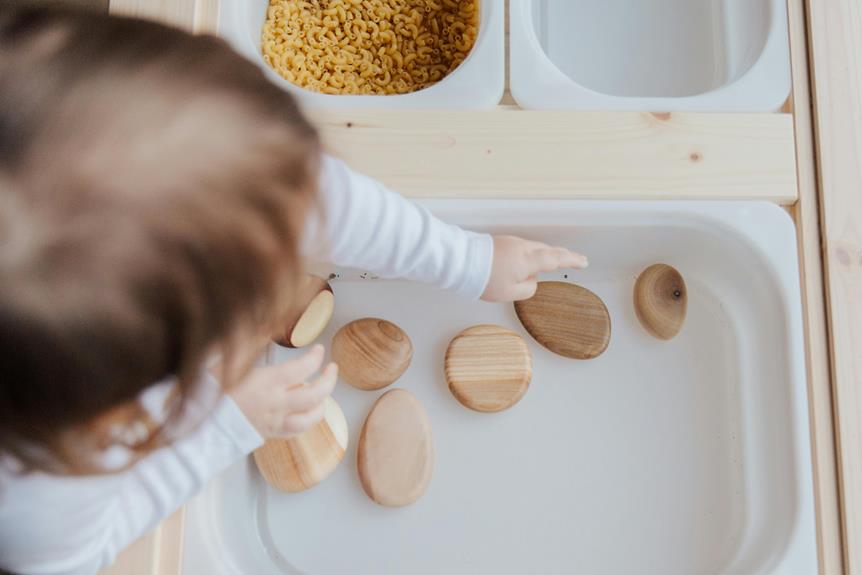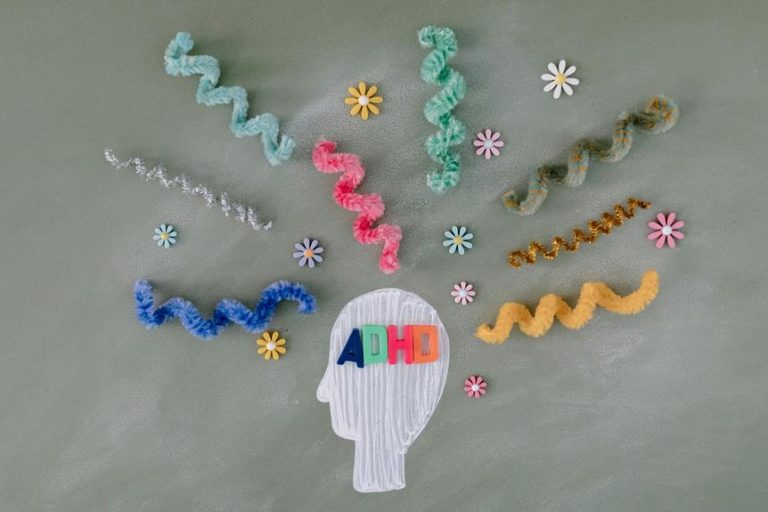Is Montessori Good for Adhd
As someone intrigued by education and its impact on children with ADHD, I stumbled upon a fascinating statistic that highlighted the potential benefits of Montessori for these students.
The data suggests an intriguing connection between Montessori principles and the unique needs of children with ADHD, sparking curiosity about how this educational approach could potentially offer a supportive environment.
The correlation between Montessori's individualized methods and the challenges faced by children with ADHD opens up a domain of possibilities worth exploring further.
Key Takeaways
- Individualized learning in Montessori supports ADHD needs effectively.
- Hands-on activities enhance focus and cognitive development for ADHD students.
- Self-directed exploration fosters independence and self-regulation skills in ADHD learners.
- Minimal distractions in Montessori promote concentration and reduce anxiety in children with ADHD.
Montessori Principles and ADHD
When considering the impact of Montessori principles on children with ADHD, the emphasis on individualized learning and hands-on activities stands out as particularly beneficial. In Montessori classrooms, children with ADHD are provided with a focused, structured yet flexible environment that caters to their specific needs. The individualized learning approach allows these children to work at their own pace, reducing the stress and anxiety often associated with traditional academic settings. By engaging in hands-on activities, children with ADHD can enhance their focus and concentration levels while actively participating in their learning process.
Additionally, the inclusive environment in Montessori schools fosters self-regulation and independence in children with ADHD. The freedom to choose activities empowers these children to explore their interests and strengths, ultimately boosting their confidence. The structured yet flexible nature of the Montessori approach equips children with ADHD with the necessary tools and strategies to succeed academically and socially, making it a beneficial educational option for these individuals.
Individualized Learning Approach
Montessori's individualized learning approach in catering to the specific needs and learning styles of children with ADHD is a cornerstone of its effectiveness in supporting their academic and personal development. In Montessori classrooms, tailored lessons are designed to meet each child's unique learning style, allowing ADHD children to progress at their own pace. This individualized approach not only helps in academic growth but also plays an essential role in developing necessary skills and knowledge effectively.
Montessori teachers play a pivotal role in adapting instruction to suit the individual needs of each child, thereby enhancing engagement and comprehension. By focusing on individualized learning, Montessori fosters independence and self-regulation in children with ADHD, providing them with the tools to navigate their educational journey successfully. The emphasis on progress at their own pace ensures that ADHD children can thrive in a supportive and understanding environment tailored to their specific requirements.
Hands-On Activities for Engagement
Hands-on activities in Montessori schools are crucial for engaging children with ADHD in learning. These techniques involve active learning strategies and practical engagement methods that cater to the individual needs and learning styles of children with ADHD.
Active Learning Techniques
Utilizing interactive learning methods in education proves beneficial for engaging children with ADHD in active participation and enhancing their overall learning experience. Hands-on activities, a cornerstone of Montessori education, help children with ADHD focus and pay attention by involving them actively in the learning process.
This active learning approach not only boosts their comprehension of concepts but also aids in better retention of information. Additionally, engaging in hands-on activities in a Montessori setting supports the development of fine motor skills and cognitive abilities in children with ADHD.
Through sensory exploration encouraged by these activities, children with ADHD can have enriching learning experiences that cater to their unique learning styles and preferences.
Practical Engagement Strategies
Engaging children with ADHD in practical activities fosters their concentration and cognitive skills, contributing to a holistic learning experience. The Montessori method incorporates hands-on activities such as sensorial materials and practical life exercises to enhance the engagement of children with ADHD.
By engaging in real-life tasks like pouring, transferring, and sorting, these children can improve their focus and attention span. These hands-on activities also play an important role in developing fine motor skills and concentration through physical interaction. Moreover, the tactile learning emphasized in Montessori aids in sensory exploration and cognitive development for children with ADHD.
Practical engagement strategies in Montessori not only promote active learning but also help in enhancing problem-solving skills and self-regulation among children with ADHD.
Self-Directed Exploration Benefits
Self-directed exploration in Montessori education offers children with ADHD the opportunity to autonomously select activities aligned with their interests, fostering engagement and focus. This approach allows children to explore topics at their own pace, promoting a deeper level of concentration and involvement in the learning process. The freedom to choose activities not only keeps children with ADHD motivated but also helps them develop a sense of ownership over their education.
Moreover, self-directed exploration in Montessori nurtures independence and self-regulation skills in children with ADHD, empowering them to take charge of their learning journey. By catering to individual interests and learning styles, Montessori's emphasis on self-directed learning provides a supportive environment where children with ADHD can thrive and develop a genuine passion for learning.
- Children can explore topics at their own pace, promoting focus and engagement.
- The freedom to choose activities helps children with ADHD stay motivated and invested in learning.
- Self-directed exploration fosters independence and self-regulation in children with ADHD.
- Montessori's emphasis on self-directed learning benefits children by catering to their individual interests and learning styles.
Minimizing Distractions in Montessori
In Montessori classrooms, distractions are minimized to create a conducive learning environment for children with ADHD. The focus is on tailoring the space to individual needs, promoting self-regulation skills important for managing attention difficulties.
Distraction-Free Learning Environment
Designing Montessori classrooms with minimal distractions is significant for fostering a focused and calm learning environment beneficial for children with ADHD. In Montessori settings, the aim is to reduce overstimulation and create spaces that promote concentration and learning. Here are some key elements that contribute to a distraction-free environment:
- Emphasis on simplicity and minimal overstimulation
- Use of neutral color palettes to reduce distractions
- Fewer items in the classroom to avoid overwhelming stimuli
- Encouraging concentration through intentional design choices
- Lowering anxiety and frustration levels by creating a less distracting setting
These strategies help children with ADHD stay focused, engaged, and better able to manage their attention in the classroom environment.
Focus on Individual Needs
Minimizing distractions in Montessori classrooms is essential for tailoring the learning environment to meet individual needs effectively. Children with ADHD benefit from the reduced stimuli in Montessori spaces, which helps in managing their symptoms.
By creating a calming atmosphere with neutral colors and simple layouts, Montessori classrooms aim to provide children with ADHD the necessary focus to engage in learning tasks. With fewer items and organized spaces, children are encouraged to learn without feeling overwhelmed or distracted.
This individualized attention to reducing distractions in the learning environment promotes a sense of control and helps children with ADHD better meet their educational needs. Montessori's focus on minimizing disruptions allows for a more productive and supportive setting for children with ADHD.
Promote Self-Regulation Skills
With a deliberate focus on fostering self-regulation skills, Montessori classrooms strategically cultivate an environment that minimizes distractions to support children with ADHD in their learning journey.
- Simplified Environment: Montessori classrooms aim for simplicity to help children with ADHD stay focused.
- Neutral Palettes: The use of neutral colors reduces overstimulation and distractions.
- Minimalistic Approach: Fewer items in Montessori spaces reduce visual clutter, aiding in self-regulation.
- Enhanced Concentration: Reduced distractions in Montessori settings promote effective learning tasks.
- Lowered Anxiety Levels: The structured environment in Montessori classrooms helps decrease anxiety and frustration, supporting the development of self-regulation skills in children with ADHD.
Tailoring Learning Pace
Tailoring the learning pace in Montessori classrooms enables children with ADHD to engage more effectively with educational materials and concepts. The Montessori approach emphasizes individualized learning, which is particularly beneficial for children with ADHD. By allowing these children to progress at a speed that suits their unique learning needs, Montessori reduces pressure and anxiety, creating a more vital learning environment. This tailored approach helps children with ADHD manage their attention better, stay engaged, and comprehend concepts more deeply.
In a Montessori setting, adapting the learning pace fosters a sense of achievement and builds confidence in children with ADHD. This confidence is essential for their overall academic and personal development. By providing the opportunity for children to work through tasks at their own speed, Montessori supports their journey in mastering skills and knowledge. Ultimately, the individualized learning pace in Montessori classrooms plays a vital role in enhancing the educational experience for children with ADHD.
Concept Isolation Techniques
Concept isolation in Montessori education involves breaking down learning materials into individual skills or ideas to facilitate focused comprehension and mastery. This technique proves especially beneficial for children with ADHD, as it allows them to concentrate on one concept at a time, preventing overwhelm and confusion.
By presenting information in a clear and structured manner, Montessori education supports the learning style of children with ADHD, helping them improve their concentration and grasp of various skills. The emphasis on concept isolation also promotes skill mastery, as children can fully understand and internalize each concept before moving on to the next.
This individualized approach to learning not only caters to the unique needs of children with ADHD but also enables all students to progress at their own pace, fostering a deeper understanding of the material.
- Montessori education prioritizes concept isolation for focused learning.
- Children with ADHD benefit from concentrating on one concept at a time.
- Individualized learning in Montessori supports skill mastery.
- Concept isolation enhances concentration and understanding of concepts.
- Montessori approach allows children to progress at their own pace.
Frequently Asked Questions
What Is the Best Education for a Child With Adhd?
For a child with ADHD, the best education involves individualized learning, positive reinforcement, a multisensory approach, a structured environment, development of executive functioning, social skills, cognitive growth, hands-on activities, and support for emotional regulation.
What Type of Child Is Montessori Good For?
In a garden of diverse learning styles, Montessori blooms for children craving individualized, hands-on, self-paced experiences. It nurtures cognitive development, executive functioning, and attention spans through multi-sensory activities and positive reinforcement.
Is Montessori Good for Neurodivergent Kids?
Individualized learning in Montessori caters to diverse needs, fostering sensory integration and cognitive development. Positive reinforcement, hands-on activities, and self-regulation support emotional and social skills. The environment promotes executive function and provides emotional support for neurodivergent kids.
Is Montessori Good for Behavior Problems?
Behavior management in Montessori involves personalized strategies. The classroom environment nurtures self-regulation and social skills. Positive reinforcement techniques support cognitive and emotional regulation. Individualized learning fosters executive functioning. Montessori's approach aids in positive behavior development.
Conclusion
To sum up, Montessori education is a marvelous method for children with ADHD. Its individualized approach, hands-on activities, and minimized distractions create an ideal environment for learning.
The tailored lessons and supportive atmosphere allow children to thrive and succeed at their own pace. Overall, Montessori's principles align perfectly with the needs of children with ADHD, making it a fantastic choice for their educational journey.







